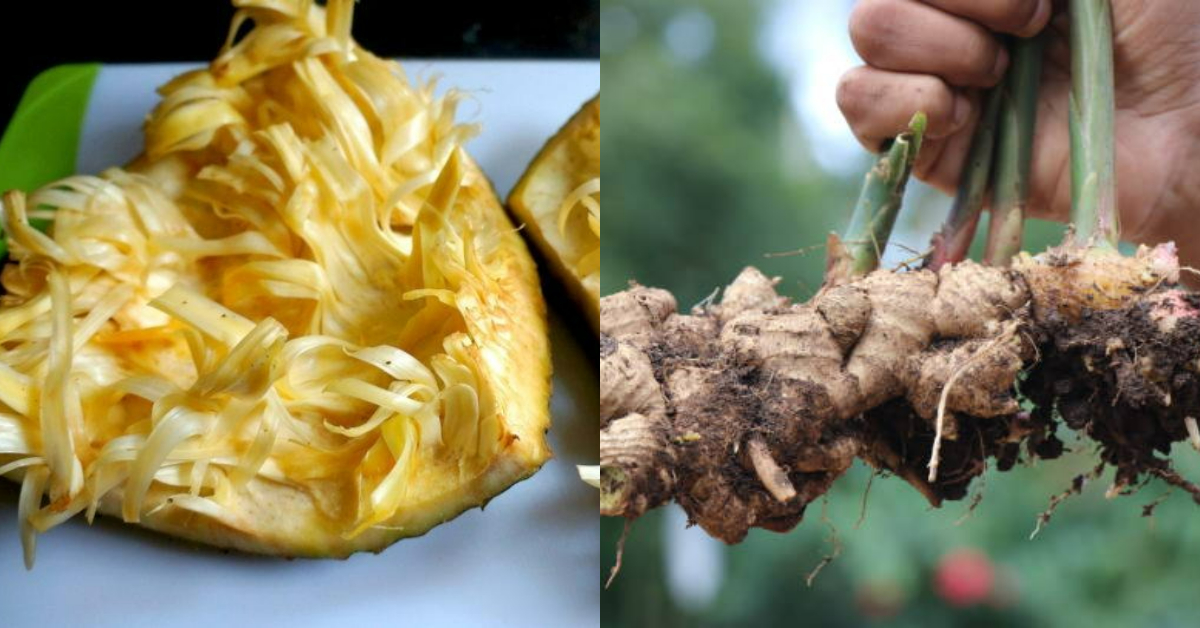
വെറുതെ കളയുന്ന ചക്ക മടൽ കൊണ്ട് ഉപകാരങ്ങൾ ഏറെയാണ്; ഇഞ്ചി ഇനി കാടുപോലെ വളർത്താം; ഈ സൂത്രങ്ങൾ പരീക്ഷിക്കൂ; ചക്കമഡേൽ മതി ഇഞ്ചി തഴച്ചു വളരാൻ..!! | Inchi Krishi Tips Using Chakka Madal
Inchi Krishi Tips Using Chakka Madal : വീട്ടാവശ്യങ്ങൾക്കുള്ള ഇഞ്ചി നമ്മുടെ തൊടിയിൽ തന്നെ വളർത്തിയെടുക്കാൻ സാധിക്കുകയാണെങ്കിൽ അത് വളരെ നല്ല കാര്യമല്ലേ. കാരണം ഇന്നത്തെ കാലത്ത് കടകളിൽ നിന്നും വാങ്ങുന്ന മിക്ക പച്ചക്കറികളിലും വിഷാംശം ധാരാളമായി അടിച്ചിട്ടുണ്ടാകും. അത്തരം സാഹചര്യങ്ങളിൽ വീട്ടിലുള്ള കുറച്ച് സ്ഥലത്ത് തന്നെ വളരെ എളുപ്പത്തിൽ ഇഞ്ചി കൃഷി ചെയ്തെടുക്കാനായി സാധിക്കുന്നതാണ്. അതിന് ആവശ്യമായ
കാര്യങ്ങൾ എന്തെല്ലാമാണെന്ന് വിശദമായി മനസ്സിലാക്കാം. ഇഞ്ചി കൃഷി ചെയ്യുന്നതിന് മുൻപായി നടാൻ ആവശ്യമായ ഇഞ്ചി മുളപ്പിച്ച് എടുക്കേണ്ടതുണ്ട്. അതിനായി ഇഞ്ചി ഒന്നുകിൽ ഒരു പ്ലാസ്റ്റിക് കവറിലോ അല്ലെങ്കിൽ തുണിയിലോ വെള്ളം തളിച്ച് പൊതിഞ്ഞ് സൂക്ഷിക്കുക. ഇങ്ങനെ ചെയ്യുമ്പോൾ ഇഞ്ചിയിൽ നിന്നും പെട്ടെന്ന് മുളകൾ പൊട്ടി കിട്ടുന്നതാണ്. ഇഞ്ചി മുളച്ച് വന്നു എന്ന് ഉറപ്പായി കഴിഞ്ഞാൽ
നടാൻ ആവശ്യമായ മറ്റു കാര്യങ്ങൾ ചെയ്യാവുന്നതാണ്. ഇഞ്ചി നടുന്ന സമയത്ത് ജൈവവളക്കൂട്ട് കൂടുതലായി ഉപയോഗപ്പെടുത്തുകയാണെങ്കിൽ അത് ചെടിയുടെ വളർച്ച ത്വരിതപ്പെടുത്തുകയും രാസവളങ്ങളുടെ ഉപയോഗം പാടെ ഇല്ലാതാക്കാനും സാധിക്കുന്നതാണ്. പോട്ടിലാണ് ഇഞ്ചി കൃഷി ചെയ്യുന്നത് എങ്കിൽ ഏറ്റവും താഴത്തെ ലെയറിലായി കുറച്ച് കരിയില ഇട്ടുകൊടുക്കാം.
ഇങ്ങനെ ചെയ്യുന്നത് വഴി പോട്ടിന്റെ ഭാരം കുറയ്ക്കാനായി സാധിക്കുന്നതാണ്. അതിന് തൊട്ട് മുകളിലായി ചക്ക മടൽ വീട്ടിൽ ഉണ്ടെങ്കിൽ അത് ഒരു ലയർ ഇട്ടുകൊടുക്കാം. വീണ്ടും പോട്ടിന്റെ മുകൾ ഭാഗത്തായി ജൈവവളക്കൂട്ട് മിക്സ് ചെയ്ത് ഉണ്ടാക്കുന്ന പോട്ടിംഗ് മിക്സ് ഇട്ടുകൊടുക്കാവുന്നതാണ്.ശേഷം എങ്ങനെയാണെന്ന് വിശദമായി മനസ്സിലാക്കാൻ വീഡിയോ കാണാവുന്നതാണ്. Inchi Krishi Tips Using Chakka Madal credit : POPPY HAPPY VLOGS
🌱 Potential Benefits of Jackfruit Seed (Chakka Madal) for Plants / Soil
Jackfruit seeds are rich in nutrients: protein, starch, minerals (potassium, magnesium, phosphorus), etc.
Using seed-powder or seed waste could:
- Add organic matter to soil, improving structure and water retention
- Supply micronutrients as they decompose
- Improve microbial activity in soil
- May act as mild fertiliser / slow-release nutrient source
⚠️ Things to Watch Out For / Precautions
- Decomposition time: Raw jackfruit seed material is hard and starchy; might decompose slowly; until then, microbes may use up soil nitrogen (temporarily causing N deficiency) — so balance with N-rich organic matter.
- Pest / disease risk: If seeds are damp or rotting improperly, could harbor fungal pathogens. Dry properly.
- pH or allelopathy: Some organic materials may affect soil pH or leach substances that inhibit growth; advisable to test on small scale first.
- Quantity: Don’t overuse; too much organic material may make soil too dense / poorly aerated.
✅ Practical “Inchi (Ginger)” Specific Tips
To use jackfruit seed material in ginger farming effectively:
- Soil Preparation: Before planting rhizomes, prepare the bed by mixing decomposed jackfruit seed compost + well-decomposed farmyard manure + soil. Ensure soil is loose, well-drained.
- Mulching: After planting, cover the soil around the ginger with mulch including jackfruit seed compost to retain moisture, suppress weeds, and moderate temperature.
- Drench / Foliar Boost: When shoots emerge (say 3‑4 weeks), apply fermented seed-waste liquid as soil drench to boost nutrients.
- Crop Rotation / Resting: In fallow periods, spread seed-waste compost to build up soil fertility for next ginger crop.
- Monitoring: Watch plant vigor, leaf color. If leaves turn yellow early, apply nitrogen source (e.g., compost or urea) to offset N tie-up.

Comments are closed.